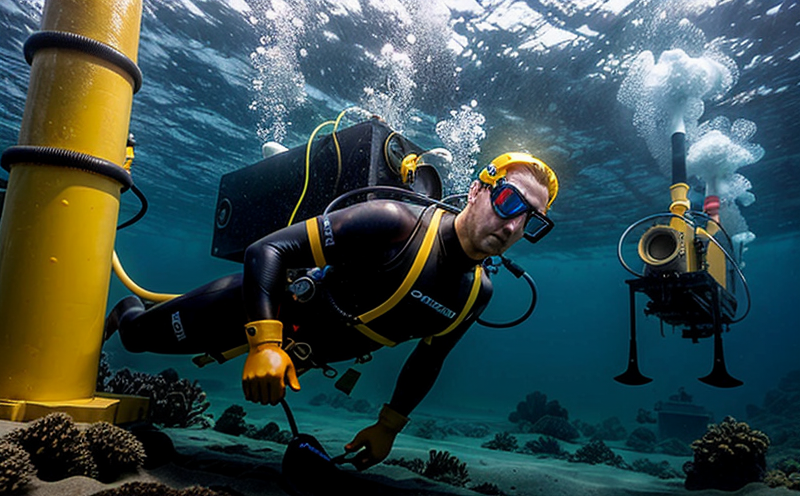ISO 20340 Offshore Coating Testing for Subsea Structures
The international standard ISO 20340 specifies a method for testing the protective coating on subsea structures, providing a framework to ensure that coatings meet specific performance criteria. This is essential in marine and ship equipment testing as it helps prevent corrosion, ensuring the longevity and reliability of subsea structures.
Subsea structures are critical components within offshore oil and gas industries. They include pipelines, risers, jackets, and other structural elements that directly interact with harsh marine environments. The corrosive nature of seawater, combined with mechanical stresses from waves and currents, necessitates robust protective coatings to maintain the integrity of these structures.
The standard defines a series of tests aimed at evaluating the resistance of coating systems against various environmental factors such as saltwater, chlorides, abrasion, and temperature fluctuations. These tests are conducted in controlled laboratory settings that simulate real-world conditions experienced by subsea structures in deep-sea environments.
One of the primary challenges in this testing is ensuring that coatings can withstand long-term exposure to aggressive marine environments without degradation. ISO 20340 addresses these challenges through a comprehensive suite of tests, including immersion tests, salt spray testing, and abrasion resistance evaluations. Each test provides critical insights into how well the coating will perform under actual operational conditions.
Another important aspect is the evaluation of adhesion between the substrate and the applied coating. This ensures that any potential failure starts at the surface of the coating rather than within the structure itself. The standard outlines specific procedures for measuring adhesion, typically using techniques like pull-off tests or tape testing to assess bond strength.
Furthermore, ISO 20340 emphasizes the importance of selecting appropriate test specimens and substrates that accurately represent real-world conditions. This ensures the relevance and applicability of laboratory results when evaluating actual subsea structures in operation. By doing so, it helps manufacturers and operators make informed decisions regarding coating selection and application.
The standard also covers the documentation required to support compliance with its provisions. Detailed records of test procedures, results, and interpretations are crucial for ensuring traceability and reproducibility of testing outcomes. This is particularly important in regulatory environments where proof of compliance is mandatory.
In summary, ISO 20340 plays a vital role in the quality assurance process by providing robust guidelines for coating tests on subsea structures. It ensures that coatings used in marine environments are effective and reliable, thereby enhancing safety and operational efficiency in offshore industries.
Benefits
Implementing ISO 20340 coating testing offers numerous benefits to stakeholders involved in the design, manufacture, and maintenance of subsea structures. Firstly, it provides a standardized method for assessing coating performance, ensuring consistency across different laboratories and industries. This standardization enhances comparability and reliability of test results.
Secondly, by adhering to ISO 20340, organizations can improve the durability and longevity of their subsea structures. The comprehensive testing procedures outlined in this standard help identify potential weaknesses early in the development process, allowing for corrective actions before deployment.
A third benefit is enhanced safety and operational reliability. Robust protective coatings contribute significantly to preventing corrosion-related failures that could lead to accidents or environmental disasters. By ensuring compliance with ISO 20340, companies can minimize risks associated with subsea structures.
Compliance with ISO 20340 also facilitates market entry into international markets where stringent regulatory requirements apply. Many countries have adopted these standards as part of their national regulations for offshore oil and gas operations. Meeting such standards demonstrates a commitment to quality and safety, which can be crucial when bidding on projects.
Lastly, ISO 20340 supports continuous improvement in coating technology through ongoing research and development efforts aimed at optimizing protective properties. As new materials and techniques become available, the standard provides a framework for incorporating these advancements into existing practices.
Eurolab Advantages
At Eurolab, our commitment to excellence in marine & ship equipment testing is reflected in our expertise with ISO 20340 coating testing services. We offer a range of advantages that set us apart as leaders in this field:
- Experienced Technical Team: Our team comprises highly qualified professionals with extensive experience in marine and offshore industries.
- State-of-the-Art Facilities: Equipped with cutting-edge laboratories and testing equipment, we provide accurate and reliable results every time.
- Comprehensive Testing Capabilities: We cover all aspects of ISO 20340 coating tests, ensuring thorough evaluation of protective coatings.
- Expert Consultation: Our engineers offer valuable insights during the design phase, helping clients make informed decisions about coating selection and application.
- Regulatory Compliance: We ensure that all our testing practices align with current international standards, including ISO 20340.
- Custom Solutions: Tailored approaches for unique project requirements, ensuring maximum satisfaction.
- Quick Turnaround Times: Efficient processing times without compromising on quality or accuracy.
Our dedication to innovation and precision makes Eurolab the preferred choice for companies seeking reliable ISO 20340 coating testing services.





